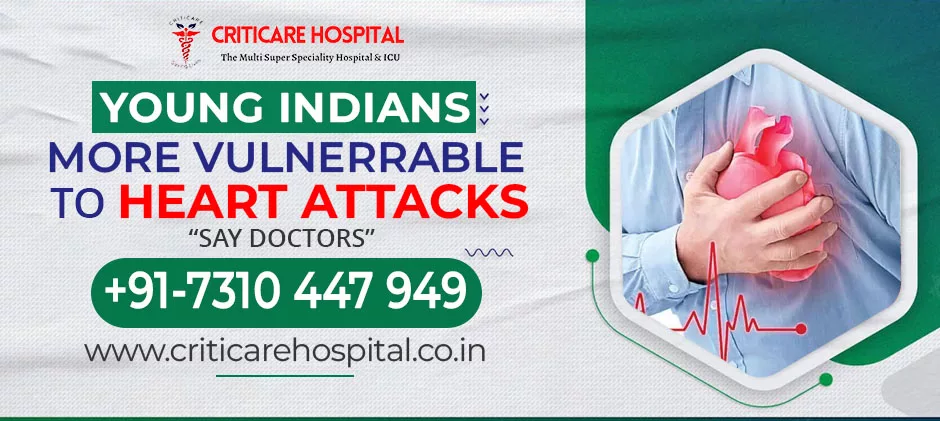Cardiac Arrest: Here’s why heart problems are rising among young Indians
Around the world, heart attacks have been the leading cause of death. The statistics on heart attacks that have been made accessible to us by medical sources firmly demonstrate this. To better comprehend the relationship between heart attacks and age, let’s look at some facts in this article.
Myocardial infarction, sometimes known as a heart attack, is brought on by a blockage in the blood supply to the heart. Fatty buildup on artery walls is thought to be the primary cause of heart attacks. The fat buildup causes the arteries to constrict and eventually rupture, which causes blood clotting.
According to age-related statistics on heart attacks, this illness kills more people than other serious illnesses. Heart attacks are primarily caused by family history, stress from the workplace, inadequate sleep, smoking, binge drinking, and a lack of exercise. You should carefully examine the facts on heart attacks that are provided below to gain a sense of how they affect people of all ages.
Why Are Hearts Of Young Indians So At Risk?
Fatigue – Lethargy, fatigue, and daytime sleepiness are all warning indicators of possible early-onset heart disease.
Feeling queasy and lightheaded – Dizziness and lightheadedness by themselves do not prove that you have heart disease.
Breath Control Issues – Given that persons who don’t exercise frequently are more likely to have dyspnea, the medical word for shortness of breath, it is simple to disregard the condition as a concern.
Anxiety in the Heart – Chest pain is a concerning symptom since it may indicate a heart attack or coronary artery disease, which is an obstruction of the blood flow to the heart.
Unexpected Areas of Pain –Most people only consider chest pain when they think about heart issues. However, discomfort brought on by cardiac conditions can occur in the other parts of the body, too.
Uneven Heartbeat Snoring While Sleeping, Cold Sweats
Coughing continuously, swelling, nausea, vomiting, and fainting are also some symptoms of heart-related problems.
What are we doing wrong?
Let’s discuss what roles lifestyle, mental health, and physical health play in heart-related issues.
People frequently inquire about their ability to maintain healthy exercise routines while still dealing with cardiac issues.
Is exercise insufficient to prevent heart disease?
This question’s solution is that stress encourages people to drink and smoke cigarettes. Exercise can be beneficial, but there are drawbacks to drinking and smoking as well.
How do our mental and physical well-being interrelate?
Our mental health suffers as a result of our hectic schedules and stressful lifestyles. More harm than good results from the professional and emotional pressure to achieve the perfect equilibrium. This may be one of the factors behind the heart attacks that young Indians are experiencing.
How significant of a factor in heart attack deaths are genetics and family history?
Heredity is the reason why Asians are more likely to get a heart attack. Whatever we try, we are powerless to stop it. Perhaps this explains why there are more heart attacks among young people in our nation.
Some additional factors are:
- Bad lifestyle habits
- Abuse of tobacco and alcohol
- Being obese
- Pressure
- Hypertension
- Diabetes
Cardiac Arrest: How to Prevent a Heart Attack?
Although heart disease is one of the primary causes of death, it is preventable. While some risk factors, such as age, sex, or family history, cannot be changed, there are several strategies to lower your heart-related problems.
Some of them include:
Vegetables, fruits, whole grains, legumes, nuts, plant-based proteins, lean animal proteins, and fish should be the mainstays of your diet. Make wise decisions, such as avoiding processed meats, refined carbs, and sugar-sweetened beverages.
Reduce sodium, added sugars, and saturated fats by using the nutrition facts label on packaged foods, and stay away from trans fat.
One of the best strategies to keep healthy, ward off disease, and age well is to move more. Adults should engage in 75 minutes of strenuous exercise or 150 minutes of moderate exercise per week. If you’re already active, you can work harder to get even greater rewards. Start becoming more active if you aren’t already by standing up more often.
Maintain an appropriate weight for you. If you are obese or overweight, lose weight. Cut back on your caloric intake and up your exercise. You can find out what your BMI is (BMI). If you require assistance, discuss a weight loss strategy with your medical team.
Don’t start smoking, vaping, or using tobacco products if you don’t already. A tobacco product that is safe to use does not exist. If giving up tobacco or smoking is difficult for you, enlist the support of your team to help you break the habit using tried-and-true techniques.
Don’t simply switch from one supply of tobacco to another. Attempt to stay away from secondhand smoke as well.
It’s crucial to cooperate with your healthcare team and make lifestyle changes if you have high blood pressure (hypertension), high cholesterol, high blood sugar, diabetes, or other illnesses that put you at higher risk. By improving one’s diet, being more active, decreasing weight, and stopping smoking, one can prevent or manage a variety of ailments.
Your doctor may recommend statins or other medications to help reduce your cholesterol, blood sugar, and blood pressure if you have a medical problem. Follow the directions on all prescriptions. But unless your doctor specifically instructs you to, avoid taking aspirin as a preventative strategy. Daily aspirin may not be of any benefit to someone who has never suffered a heart attack or stroke and may even increase their risk of bleeding.
To live a longer, healthier life, our medical team can help you lower your risk of developing heart disease or stroke. Develop your preventative strategy jointly. When attempting to make healthy changes, be transparent about any difficulties you may have by asking questions.
Your health and well-being can be impacted by a variety of factors, including stress, sleep, mental health, family dynamics, cigarette use, food access, social support, and other problems.




